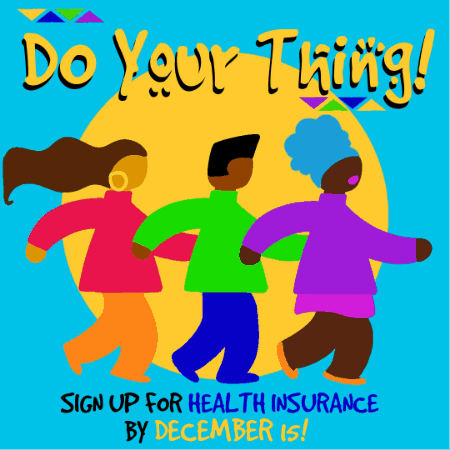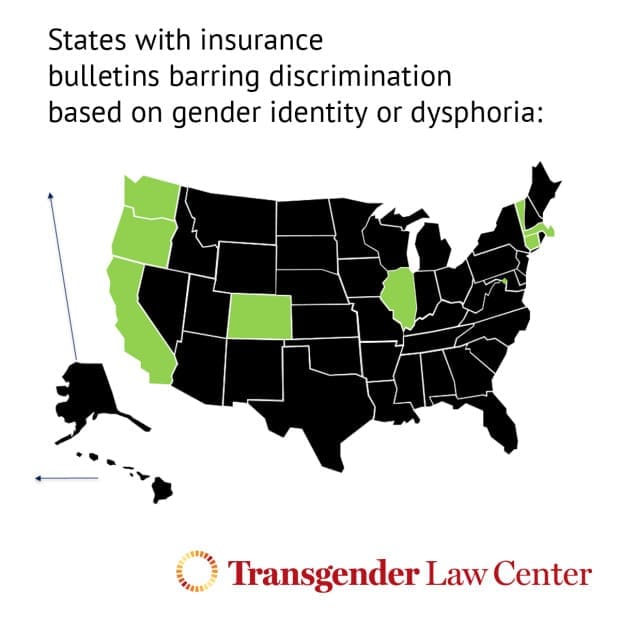By Kirstin Brockenborough
 Enrollment in the Illinois Health Insurance Marketplace will be open for a few more days, and the excitement for another year of the Affordable Care Act (the ACA, a.k.a. Obamacare) is still in the air. (It could also be climate change, but who knows!)
Enrollment in the Illinois Health Insurance Marketplace will be open for a few more days, and the excitement for another year of the Affordable Care Act (the ACA, a.k.a. Obamacare) is still in the air. (It could also be climate change, but who knows!)
The ACA created a way to expand Medicaid and create more opportunities for people to enroll in health care. Since Obamacare was signed into law back in 2014, it has enabled over 20 million people to have health insurance in the U.S., including three out of five Illinoisans living with HIV. Its impact is huge, especially for the HIV community!
This year, the Trump administration has actively targeted trans people by attempting to erase trans and gender non-conforming (GNC) communities and taking away key protections of Obamacare legally preventing gender-based discrimination. To eliminate these key parts proves to be dangerous, as these communities are historically overlooked and demonized for wanting to receive basic human rights to thrive in this world.
This is a social issue that requires continuous education and multi-pronged advocacy on our part to tell people in power that our trans/GNC siblings will continue to die unless we improve our harmful systems.
It should be emphasized and acknowledged that Black trans and GNC people face the highest levels of discrimination. As seen in the recent survey, Injustice at Every Turn: A Look at Black Respondents in the National Transgender Discrimination Survey, the numbers don’t lie:
- Black transgender people had an extremely high unemployment rate at 26 percent, two times the rate of the overall transgender sample and four times the rate of the general population.
- A startling 41 percent of Black respondents said they had experienced homelessness at some point in their lives, more than five times the rate of the general U.S. population.
- Black transgender people lived in extreme poverty with 34 percent reporting a household income of less than $10,000 per year. This is more than twice the rate for transgender people of all races (15 percent), four times the general Black population rate (9 percent), and eight times the general U.S. population rate (4 percent).
- Black transgender people were affected by HIV in devastating numbers. More than one-fifth of respondents were living with HIV (20.23 percent), compared to a rate of 2.64 percent for transgender respondents of all races, 2.4 percent for the general Black population, and 0.60 percent of the general U.S. population.
To put it in perspective, anyone who is non-white and identifies as anything other than an able-bodied, “middle-to-upper class,” heterosexual, white cis-man are part of a marginalized community. This indicates we are more likely to run into issues accessing affordable health care, housing and employment opportunities to survive.
Let’s be real: transphobia, along with racism, homophobia and other insidious forms of oppression cannot be cured overnight. We can start to break down these harmful systems by placing our trust and investment in trans and GNC leadership and decision-making to improve health access. I fear that if larger public health organizations do not actively do this, they are complicit in the harm against our trans and GNC siblings.
What can we do?
- To learn more about how to support trans and GNC folks, contact and volunteer for some local community organizations: Brave Space Alliance, Trans Liberation Collective, Howard Brown Health, and Illinois Caucus for Adolescent Youth to name a few.
- Reach out to legislators to advocate for health care specific to trans and GNC folks. Go to AFC’s website to find out who your legislators are and let them know how they can advocate for our collective community’s health.
- Open Enrollment ends on Saturday, Dec. 15! Make sure to enroll in health care using healthcare.gov. If you’re a person living with HIV, we have resources and people who can help getting enrolled in care that works with ADAP! For resources on trans and GNC-specific health care, check out this guide from The National Center for Trans Equality.

